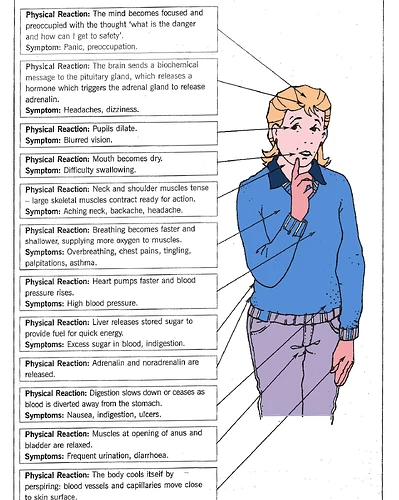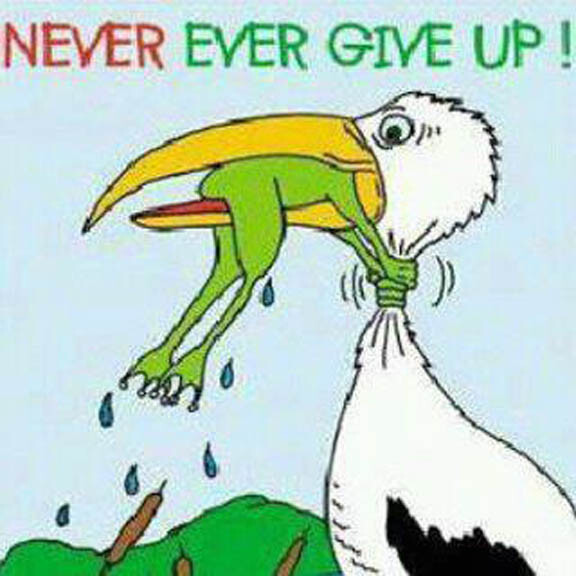I know many of you wise stroke survivors have cautioned me to not give into fear too much but it still rears it’s ugly head. I have not improved at all with walking and spent the better part of two weekends ago in the hospital for observation and an MRI. I have cerebral small vessel disease and there are many different opinions about whether this is causing parkinsonian syndrome. Consult with a hospital nuerologist says that I don’t have this but between the uncomfortable walking plateaue, hand tremor and no relief from exhaustion I am scared at ninemonths out of not being really able to function. I want to see light at the end of the tunnel.
Sorry you’re struggling @Mbhope it is so difficult to get rid of these fears sometimes. Trying to find a way to accept where you’re at is important but is easier said than done. Have you thought about counselling? A lot of people find it helps.
Sending you my very best wishes.
Ann xx
Thank you for your reply. Yes I do participate in counseling. It just doesn’t seem to be enough when I so desperately wish to be able to have stamina for at least 1/4 of the day, or hike, wear a different pair of shoes, not be stiff or in pain, etc, etc. I know I quite frequently am a big baby wawah on here but I think only people who experienced this can understand. If one more person asks me if I’m"feeling better" I might just scream. No I’m not and unfortunately after nine months I am left with pain and stiffness that nothing seems to alleviate. I feel comforted at least by all of you.
There’s a lot to adjust to.
The fear bit I don’t have an answer to. When my body doesn’t feel right in a new way that could be ‘in my head’ it seems reasonable to suspect a new neuro cause. That leads to anxiety which is a new physical feeling and the vicious circle
For the fatigue some find it useful to keep a diary of activity & nutrition, hydration, med changes etc then look for correlations from the last few days to get a handle on what has what impact and recovery profile etc
Just a suggestion
Shwmae @Mbhope, I know it is painful everyday, I try and seek those intermittent comforts, those moments that pamper myself that only I alone can indulge in, and that is what prepares me for the next ordeal. Stay brave ![]()
Mbhope- HI! I don’t know your condition, but I just want to say that I’ve plateaued several times in my recovery from total left-side paralysis to walking a mile a day. It probably took me a couple of years to get to that place-- likewise with the exhaustion. Now, at the 4 1/2 year mark, I’m not constantly exhausted, like I was at nine months, but I still tire easily and have to watch myself that I don’t overdo like I used to be able to do. Most stroke survivors will tell you that nine months is not very long in stroke recovery. So, take heart. There is light at the end of the tunnel. I’ts just not a short tunnel. ![]() Jeanne
Jeanne
I can’t thank you all enough. I find a bit of comfort in everything you say even if we are not all suffering the exact same way.
Great pic ![]()
![]()
![]()
![]()
Thank you for your reply. I have up until this point always framed negative thoughts this way- taking them out and really examining. Only thing is I feel like this is the only time that maybe they are not so ridiculous, even though diminishing hope is not helpful in the least. No matter what I will continue to try, go to therapy and work hard. In the meantime, as you know, it gets tough. I come here and am reminded that you all are finding ways to move forward.
Hi
First: at 9mths there hasn’t been much time for things to improve.
Crudely 6mths can be taken for the brain to physically adjust to damage - eg reduction in swelling, dealing with necrotic tissue et al.
During that time new types of issue and fatigue sources are speculated to occur.
The body is also aclimitising to meds, skeletal/muscles adjust to the fact that gait, bowels, posture etc are all different etc
That’s like many mini changes that occasionally reach a tipping point to give aftershocks - each of which is an anxiety trigger. The fear is hard to dispel when a sudden change (from gradual changes) is felt when the last really memorable change was the stroke. We pattern match and interpret ‘what could’ to be ‘what was the reality’ or worse. It’s a survival mechanism when working correctly but unwanted in this context.
Have you tried any any mindfulness techniques - tia chi type, breathing control, meditative & contemplative, music, painting or pottery or gardening or volunteering or… etc - there is a wide range of ‘purposes’ that use time in ways that precluded dwelling on the morbid spiral. I believe “neuropsychologist” is the role title for those that might help with the fear bit.
2nd - I’ve found that the medics just don’t understand timings. I had PT giving me exercise month 1 & 2 that now at mnth 26 I find useful but then was just a cause for despair. Ever prof’nl who also had a stroke that I’ve heard has said how they understand how wrong they were. You have to be you own recover director integrating the separate specialisms at the right time because they don’t really have a visceral understanding - but like no one can ever scratch your back with the right combination of nails or knuckles, pressure & duration and migration
Much appreciation for all your comments.
Honestly, my fear is,
Will I ever recover from my stroke pain condition?
Will I get back just SOME of my stamina in order to be able to participate in life more?
Can I be thankful for my ability to drive and even to walk although it’s tough to manage for long distances or when I have to carry anything ?
I’ve been working hard in therapy for the last nine months which is about to end soon but on a positive note I can continue to do some
additional exercises in the community y that I learned in aquatic therapy.
I’m scared.
But I will keep trying.
Thank you.
Nobody knows for sure ![]()
but
I’ve got 70% leg back, 60% arm, 30% hand and improving all the time.
That’s sorta typical - things generally improve proximally to distal (with continual effort)
I could not get ANY straight answers from anybody who was employed as med staff.
I’ve heard lots of stories of other people improving too. I’ve heard a few stories of people not improving. I’ve heard med staff say improvement stops after 6 months which is complete ignorant bollox that they have no business repeating. Most of my upper limb improvements didn’t materialise till 12-18mths.
Fear is a natural reaction. There is stuff to be fearful of so take your meds, ask for the cause (I haven’t been given one ![]() ) and try to follow the exercise routine you think is right for you with advice from ot, pt etc but remember they can’t feel it like you and I haven’t found most of them very good at understanding but they do know exercises and some are better than others. YouTube and peer support and intuition has been at least as useful - combined with acceptance of where I am at, patience with longer improvement time scales then I’d like, niggling things that delay (like frozen shoulder, diarrhea, spurious aches, bad back and a litany of stuff that I’ve overcome and I hear others have different stuff but similar/ equiv.
) and try to follow the exercise routine you think is right for you with advice from ot, pt etc but remember they can’t feel it like you and I haven’t found most of them very good at understanding but they do know exercises and some are better than others. YouTube and peer support and intuition has been at least as useful - combined with acceptance of where I am at, patience with longer improvement time scales then I’d like, niggling things that delay (like frozen shoulder, diarrhea, spurious aches, bad back and a litany of stuff that I’ve overcome and I hear others have different stuff but similar/ equiv.
Ask for help and be prepared to have to interpret and integrate for your self.
Many of us have learned to set the fear mostly aside but ive found that it takes time and never goes away entirely but it’s liveable now
I hope this helps. There are loads of people’s stories here and on the net. Many are uplifting
“Most of my upper limb improvements didn’t materialise till 12-18mths.”
Thank you so much for sharing that!
I can imagine of your like me you want to know what the range of outcomes others have to know trying is worth while.
I am going to post my collective UL observations and hypothesis on gaining improved use.
One thing to say now is learned non use is the key enemy. It’s hard to combat, seductive. The best time to start was yesterday the second best time is today
Thank you , Alan–That idea is a really good one, and new to me. I’ll try it next time my mind is spinning out of control. Jeanne
Your picture just sums it up made me smile thank you
Can anyone please let me know when this fear grips you, what you might say to yourself when the Drs have changed previously positive news?
Just recently I was hospitalized and the consulting nuerologist, without examination said I did not have post stroke parkinsonism. Great I thought. Then my regular nuerologist and said well we could have ten different clinical opinions. Went back to the nuerologist I saw in the hospital on Friday who said his only basis for saying not Parkinsonism is my lack of response to the medication. Not very convincing and I’m gaining a lot more fear once again. They suggested I try another nuerologist speciality, movement Drs Ten months of therapy , a million appointments, medication and no answers, or relief from stiffness and pain. Sorry for the tone of this, just looking for anyone who felt similar or somehow managed to wade through the unknown and lack of continued progression.
Mb hope – Not being a doctor and everyone’s experience being different, I can’t offer any advice about your situation in a physical sense. All I can say is that for a few months after my stroke I went through many doctor appointments and medications. Eventually, a medication was found that I could tolerate and things began to get better. I think eventually the right doctor will find the right way to help you feel better. I can’t praise CBD oil drops under the tongue enough, for the relief of anxiety, and muscle spasms it gave me. Many others find it useful for relief of pain. It may or may not help you. I checked with my doctors first. Although I felt rotten and was depressed during those times, I repeated a mantra to myself every day, usually several times a day, that my mother taught me: “Every day in every way I’m getting better and better.” I think that even if your conscious mind isn’t sure that’s true, you’re programming your subconscious mind. It believes whatever you say. I hope things get better for you soon. I’ll remember you in my prayers tonight. ![]() Jeanne
Jeanne
Thank you for your kind response.
I get these feelings often and get really upset, I too want to be better than I am just now but like you can’t see the light at the end of the tunnel. Lately I’ve been feeling really low as far as self pity, I re never done self pity , is it because it will be my 1 year from stroke on 18th? Hate feeling like this , I’m not enjoying this roller coaster anymore and want off onto a better track, I used to bre so positive, want it back! Any advice would be gratefully received. Thank you in advance. X


